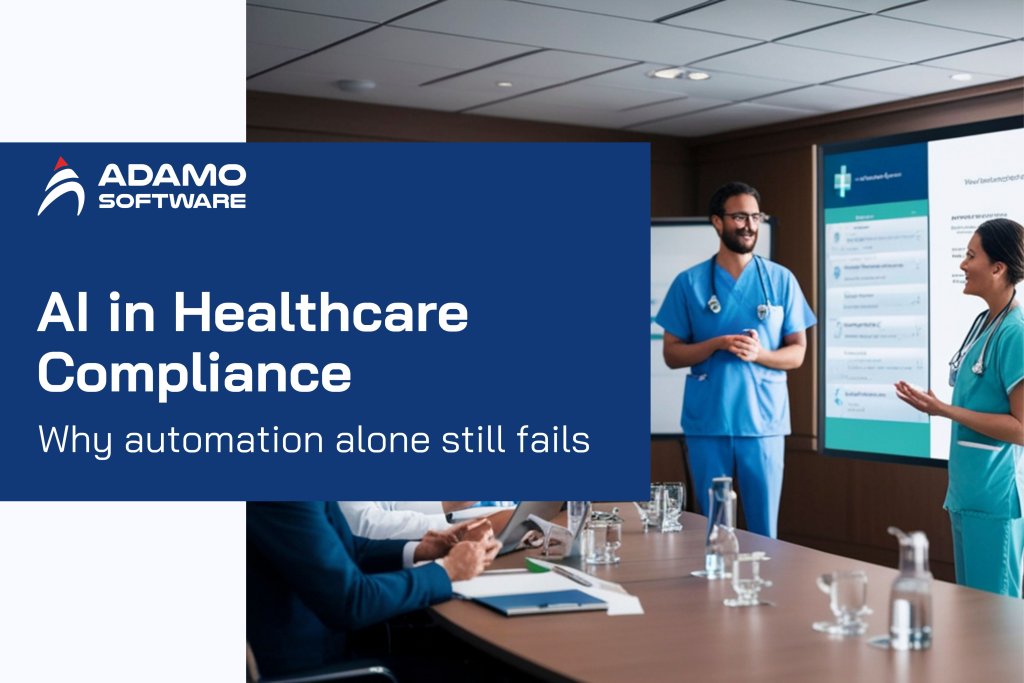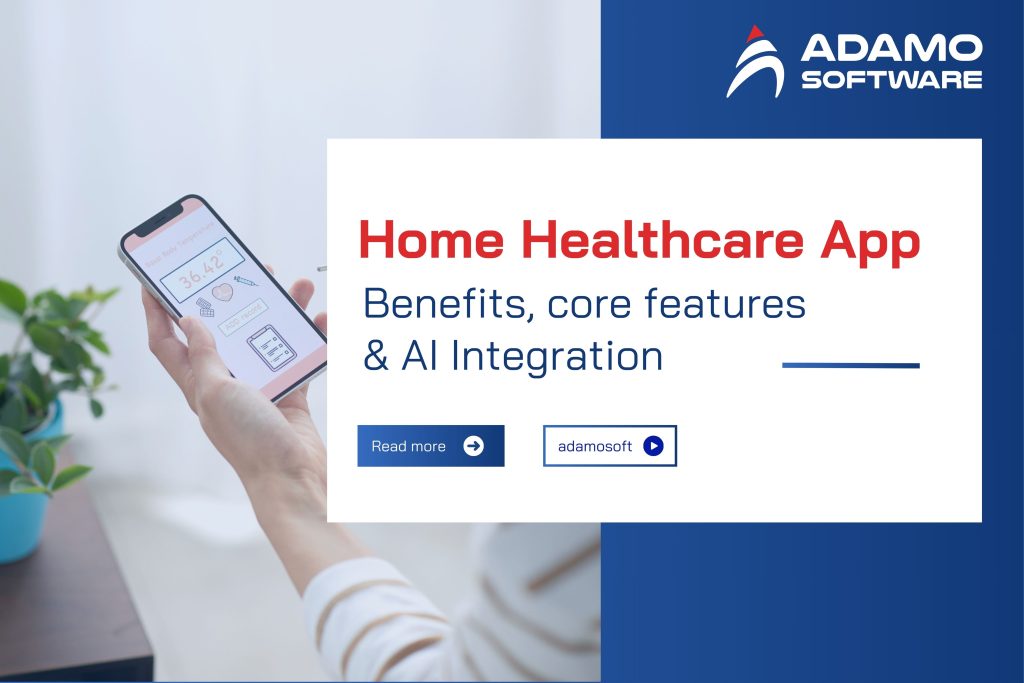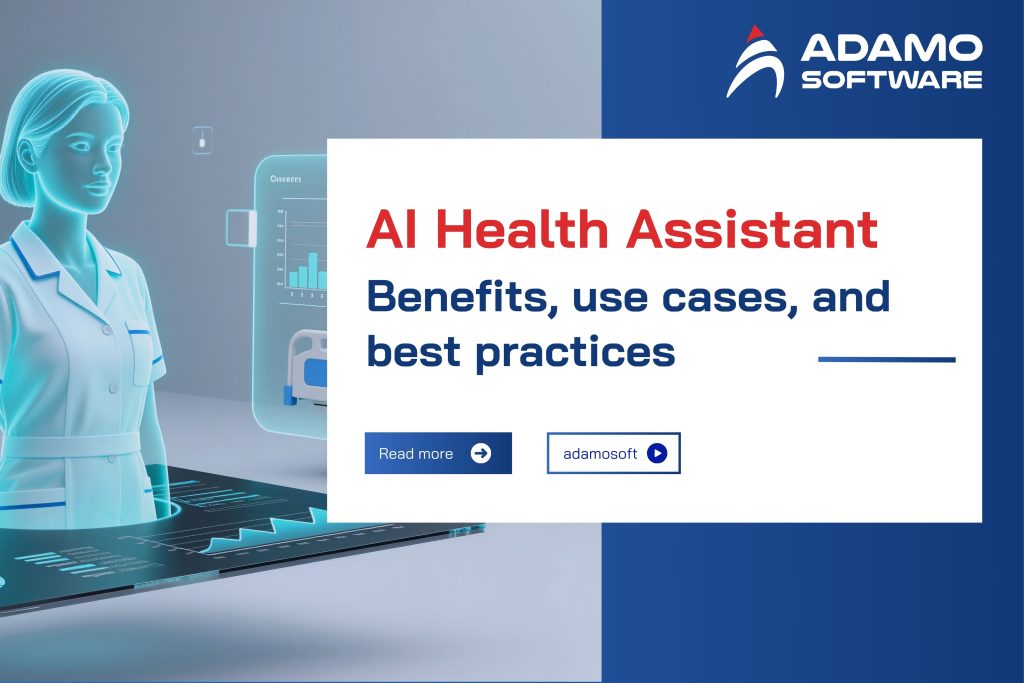Data Storage in Healthcare: Understand Benefits, Challenges and Solutions
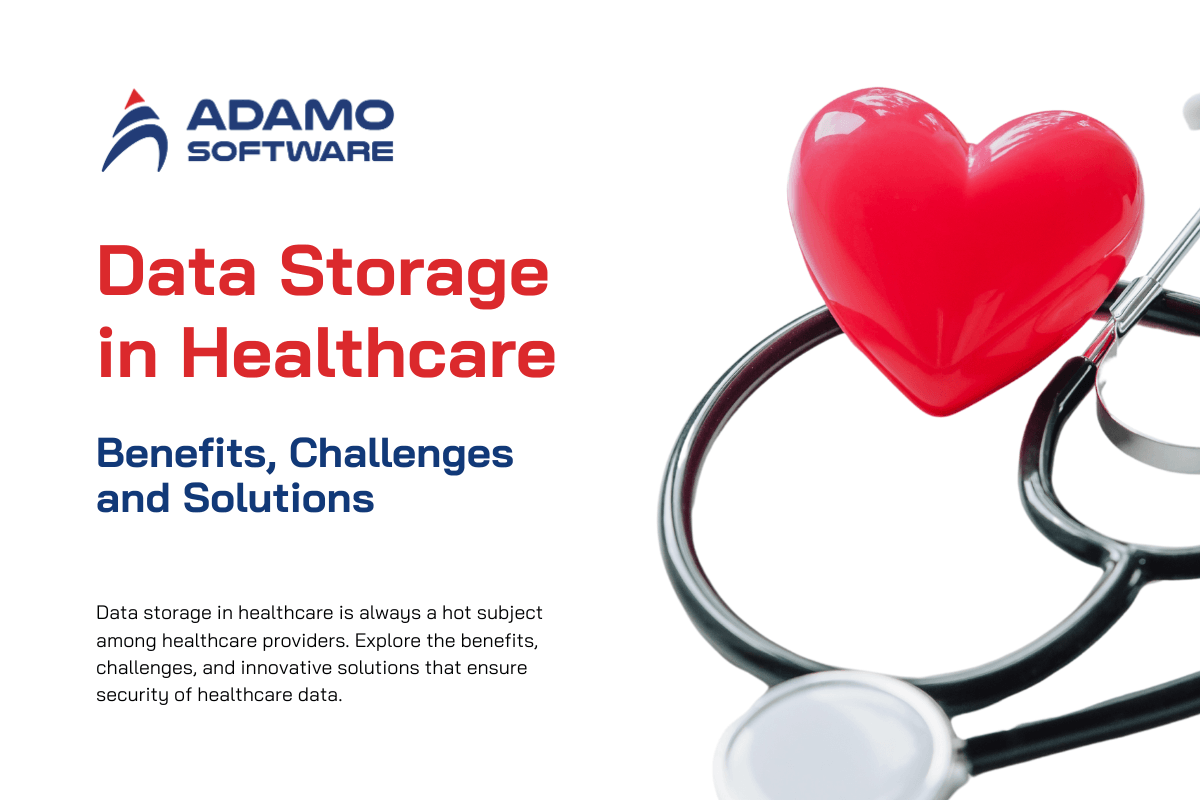
Last year, the global data storage in healthcare market reached $3.08 billion and is projected to grow by 10.7% annually, surpassing $6.12 billion by 2027.
This explosive growth in healthcare data presents numerous opportunities for medical organizations. With the right health data management strategies, healthcare organizations can gain valuable insights to enhance preventive medicine and provide better patient care.
However, keeping medical information accurate, up-to-date, and secure is always a big challenge.
Adamo Software – specializing in healthcare software development – will help you explore new, more effective ways to store, access, retrieve, and manage your data to fully leverage its potential.
This article will guide you on data storage in healthcare, why it is important and what challenges a healthcare organization can face and best practices.
I. Why Data Storage Is Important in Healthcare
Data storage in healthcare involves the processes of collecting, storing, retrieving, transferring, and protecting data. It allows healthcare providers to assess medical information and use it to find actionable insights. However, that’s just one aspect. Below are further benefits that effective health data management can bring:
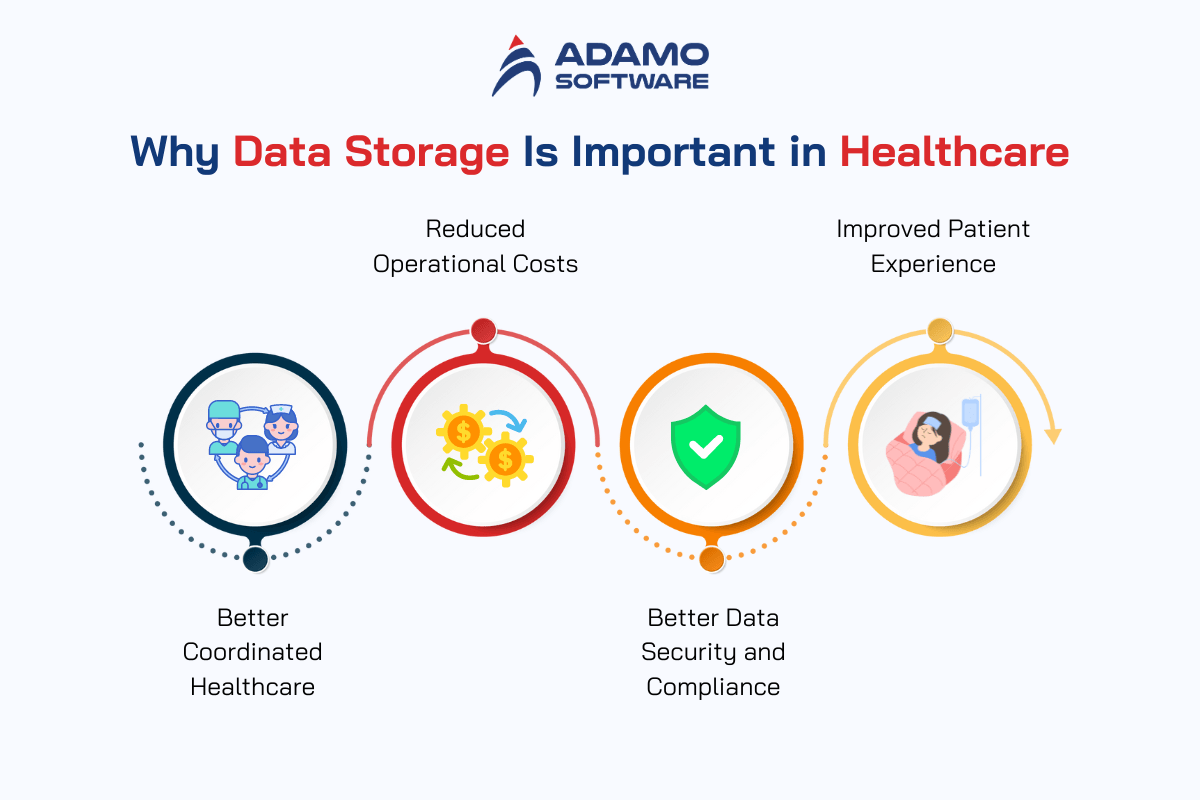
1. Better Coordinated Healthcare
Effective data storage in healthcare helps healthcare providers to access and share patients’ health records, regardless of where the services were provided. All the information collected by a healthcare organization can be securely stored and shared with just a few clicks.
What’s more, only authorized users can access the database from any location, with access permissions set by admin users. For example, data about a patient can be shared with specific specialists to foster a collaborative environment. Also, necessary information can be shared with insurance or government organizations upon request.
Accurate and relevant data transferred securely between healthcare providers would ensure prompt service and accurate medical treatment.
2. Reduced Operational Costs
Healthcare providers often deal with fluctuating data volumes due to patient admissions, diagnostic tests, and medical records. Better data storage management results in reduced costs in several areas.
Especially when it comes to cloud data storage, healthcare organizations can dynamically scale resources up or down based on actual usage, minimizing operational overhead and reducing costs.
3. Better Data Security and Compliance
A recent survey has pointed out that breaches resulting in the loss of confidential patient data and cyberattacks on hospital operations are top concerns for healthcare IT professionals. Hospitals and medical centers handle sensitive data, such as medical and payment information, and are subject to stringent regulations to ensure privacy. For example:
_ HIPAA sets requirements to secure protected health information (PHI).
_ PCI DSS ensures that companies accepting, processing, storing, or transmitting credit card information protect sensitive cardholder data from breaches and unauthorized access.
Effective data storage in healthcare offers advanced security measures, including encryption, access controls, and audit trails, to ensure compliance with these regulations while maintaining data integrity and confidentiality.
4. Improved Patient Experience
Protecting patients and their data is an ethical and legal obligation in the healthcare industry. Extending protection measures beyond regulatory compliance standards demonstrates your commitment to your patients. Secure data storage in healthcare and management ensures the success of future visits by keeping patient records, clinical software, and admissions processes safe from malicious activity or natural disasters.
Healthcare data management not only improves operational efficiency and compliance but also enhances patient care and trust. With the right solutions, healthcare providers can leverage data to provide better care, reduce costs, and maintain robust security.
II. Data Storage Challenges in Healthcare
Storing and managing large volumes of healthcare data presents big challenges. Healthcare providers (even the top-tier organizations) often struggle with multiple issues when it comes to data storage in healthcare, and here’s why:
1. Effective Data Processing in Healthcare
Healthcare organizations interact with data in many ways, so that making effective processing a real challenge.
_ Effective data capture
Firstly, medical data is diverse. Imaging data, for example, varies widely – X-rays differ from MRIs, and general hospital images differ from those in specialist hospitals. That’s why ensuring data captured is clean, complete, accurate, and correctly formatted for use in multiple systems is really difficult. EHRs (electronic health records) are rarely transmissible, interoperable, or easily deployable, lacking standardization in the healthcare industry.
_ Ensure efficient data cleaning
Poor data storage in healthcare hygiene can derail big data projects and impede digital transformation in healthcare. Manual data scrubbing is time-consuming, and while automated solutions exist, they can be expensive and often out of reach for underfunded healthcare organizations.
_ Find appropriate data querying
Appropriate data querying is foundational to accurate reporting and analytics. However, disparate and uncommunicative data silos across healthcare operations and external data transfers prevent centralized and holistic querying, limiting effective data use.
2. Cybersecurity Challenges
Cybersecurity is a critical concern for any industry and healthcare is not an exception. Organizations must be vigilant against cyber threats, focusing on:
_ Data storage options
Healthcare organizations face a choice between on-premises storage, cloud storage, or a hybrid approach. As we mentioned before about these options, in short, on-premises storage offers control but can be challenging to maintain and expensive to scale. The cloud, on the other hand, offers benefits such as agile disaster recovery and lower upfront costs but requires careful selection of partners who understand healthcare-specific compliance and security issues.
_Security expertise and tools
Data storage in healthcare security must be the top priority for any healthcare providers. You need enterprise-class data protection and security, including secure access to patient care information from any location, maintaining privacy and compliance controls, automatic protection from external threats, integration with corporate IT security systems, and internal user tracking.
3. Ensuring Positive Patient Experiences
Data is only valuable if it positively impacts outcomes and improves user experiences. Data management must focus on:
_ Reporting
Data must be accessible and ensure accurate and reliable downstream impact on the end-user. In contrast, poor data quality leads to bad reports, affecting clinical decision-making and patient outcomes.
_ Visualization
Good data visualization helps clinicians absorb information easily. Also, effective presentation practices offer a precise picture, promoting patient-record understanding and accelerating clinical processes.
_ Sharing
Distributed access and external data sharing are important as more patients visit multiple organizations. System and storage design differences can impair clinician decision-making, patient follow-up, care strategies, and outcomes. Proper data sharing ensures that critical information is not missed, such as the impact of medication on a patient’s condition.
III. Understand Benefits of Data Storage in Healthcare
1. Synchronized healthcare
The significance of data storage in healthcare refers to the ability to have accessibility and transfer the health records of patients among parties. Also, boosting the data storage in healthcare helps ensure the accuracy and relevance of such health data among healthcare providers to guarantee prompt healthcare services and treatment.
2. Reduce operation costs
Proactively managing healthcare data helps reduce expenses for healthcare providers. For example, a central data storage in healthcare and its management system in the cloud-based helps cut down costs on administration. It also saves time for healthcare clinicals to deal with some data sources to find out needed information.
3. Better data analysis
Appropriate data storage in healthcare and health information exchange is a basis to use innovative technological advances. For example, machine learning helps analyze patients’ records and determine healthcare trends in specific areas.
Besides, it helps healthcare institutions construct an overall view of health condition and take essential preventive practices. They can range from personalized healthcare suggestions to measures to deal with health-based issues.
4. Enhanced patient experience
Patients get benefits from enhanced data storage in healthcare and its data management to improve their experiences. As all data is accessed, then they do not need to do it over again. Besides, centralized data storage in healthcare provides patients with large accessibility to their health care information. Improved transparency promotes engagement for patients and enhances the accuracy for data recorded.
IV. Data Storage Options for Healthcare Organizations
Continuous developments in modern medicine have introduced new technology used in patient care, particularly for data storage in healthcare.
Traditional healthcare data storage options are vital to protecting electronic health records (EHR), digital pathology reports, next-generation sequencing results, and other sensitive information.
Common methods of data storage include:
_ On-premises approach
_ Cloud storage method
_ Hybrid solutions.
Let’s dig deeper
1. Cloud Data Storage in Healthcare
Cloud data storage in the healthcare industry refers to the secure and scalable storage of patient records, medical images, clinical data, and other healthcare-related information on remote servers managed by cloud service providers.
The healthcare data storage market is poised to grow at a CAGR of 14.5% during the 2024-2032 period, with the cloud considered the backbone of healthcare data management.
Pros
_ Quick setup and maintenance
_ Purchase required disc space based on demand
_ Hassle-free maintenance
_ Easy to scale up and down
_ No need for extensive physical infrastructure
_ High data security
_ Automatic backup and disaster recovery tools:
_ Adheres to healthcare regulations
Cons
_ Dependent on internet speed.
_ Complete reliance on the internet connection
_ Sensitive data has to be transferred to a third party
_ Limited internal control
_ Dependence on a single provider
2. On-Premises Data Storage Approach
On-premises data storage in healthcare refers to data storage solutions located within an organization’s physical premises, such as a server room or data center.
In this model, healthcare provider owns and manages the storage hardware and software and is responsible for maintaining, upgrading, and securing the data.
On-premises data storage solutions are often favored by healthcare organizations for their ability to maintain a high level of control over their data, crucial for data privacy and security. But this method storage can be complex and expensive to manage and may not be ideal for healthcare organizations with limited IT resources or those needing to store large amounts of data.
Pros
_ Data is stored in a physical facility
_ Sensitive information isn’t shared with third parties
_ Complete control over hardware and software
_ Well-tailored data storage that matches a company’s business specific requirements
_ Comprehensive downtime control
_ Ensures adherence to healthcare standards
_ Data can be accessible offline
Cons
_ High installation and maintenance costs
_ Ongoing technical support needed
_ Challenging to expand as needed
_ Data security and compliance have to be ensured by a hospital
_ Potential physical vulnerabilities
3. Hybrid Healthcare Data Storage
Hybrid data storage combines the best advantages of on-premises and cloud storage. In hybrid environments, health data maintains flexibility, scalability, performance, and control at a low cost.
Healthcare organizations can store sensitive data on-premises to ensure maximum control, while moderately sensitive data is housed in the cloud.
Pros
_ Easily adjust resources
_ Flexibility in data placement
_ High data security
_ Automatic backup and disaster recovery tools
_ Meets industry standards and compliance
_ Enhanced security measures
Cons
_ High installation costs
_ Requires careful integration
_ An on-site technician is required
Below is the table showing pros and cons of 3 aforementioned methods:
| Pros | Cons | |
| Cloud Data Storage | _ Quick setup and maintenance
_ Purchase required disc space based on demand _ Hassle-free maintenance _ Easy to scale up and down _ No need for extensive physical infrastructure _ High data security _ Automatic backup and disaster recovery tools: _ Adheres to healthcare regulations |
_ Dependent on internet speed.
_ Complete reliance on the internet connection _ Sensitive data has to be transferred to a third party _ Limited internal control _ Dependence on a single provider |
| On-Premises Data Storage | _ Data is stored in a physical facility
_ Sensitive information isn’t shared with third parties _ Complete control over hardware and software _ Well-tailored data storage that matches a company’s business specific requirements _ Comprehensive downtime control _ Ensures adherence to healthcare standards _ Data can be accessible offline |
_ High installation and maintenance costs
_ Ongoing technical support needed _ Challenging to expand as needed _ Data security and compliance have to be ensured by a hospital _ Potential physical vulnerabilities |
| Hybrid Healthcare Data Storage | _ Easily adjust resources
_ Flexibility in data placement _ High data security _ Automatic backup and disaster recovery tools _ Meets industry standards and compliance _ Enhanced security measures |
_ High installation costs
_ Requires careful integration _ An on-site technician is required |
V. Best Practices for Data Storage in Healthcare
Recent healthcare data breach statistics clearly show an upward trend in data breaches over the past 14 years, with 2021 seeing more breaches reported than any other year since records first started being published by OCR.
Also, data breaches increased again in 2022, with OCR receiving reports of 720 data breaches of 500 or more records. In 2023, the trend continued with 725 data breaches reported and over 133 million records exposed or impermissibly disclosed.
With the current threat landscape and the ramifications of improper data storage, healthcare organizations should consider implementing the following five best practices for data storage in healthcare and management:
1. Implement File-Level Encryption
Encryption scrambles the contents of the data file so that only authorized individuals can access and understand it, requiring the correct encryption key to decrypt the information. With encrypting sensitive files, healthcare providers can limit the impact of data breaches, prevent unauthorized access, and comply with applicable regulations such as HIPAA, PCI-DSS, and GLBA, which require encryption at rest and in transit to ensure data privacy.
_ Stored on a server, database, flash drive, mobile device, backup storage, or other designated location
_ Traveling between systems or devices
_ Encrypting both data at rest and in transit ensures maximum protection.
2. Manage the Business Associate Relationship
Healthcare organizations often rely on third parties for day-to-day operations, and any third-party handling PHI must comply with HIPAA rules. Responsibilities of the covered entity and its business associates are detailed in a business associate agreement (BAA).
_ Conduct assessments to identify data vulnerabilities
_ Both parties can be held liable for data breaches
_ Penalties for HIPAA violations are tiered based on contributing factors
3. Protect Data Backups
Backing up data is vital for information management. An informed backup strategy ensures data protection if the original dataset is lost or compromised. The 3-2-1 rule is recommended: maintain three copies of data on two types of storage media, with one copy stored offsite.
Here are some backup methods you can consider:
_ Full backup: Duplicates all existing files
_ Differential backup: Copies files added or changed after the last full backup
_ Incremental backup: Copies data added or changed since the last backup, making it the fastest option
4. Adhere to Data Retention Requirements
State and federal guidelines inform how long data must be stored and maintained. Retention requirements stem from entities such as CMS, OSHA, and HIPAA.
Federal requirements involve:
_ CMS: Medical records for at least five years
_ OSHA: Employee exposure records for 30 years
_ HIPAA: Records for six years
_ State Requirements: Vary by state and type of covered entity (e.g., physicians and hospitals in Texas have different retention periods)
5. Secure Access and Permission
Access control measures and security permissions can ensure that only authorized individuals can store, retrieve, and use healthcare data. Limiting access based on the principle of least privilege (POLP) is crucial.
_ Define access levels and monitor user activity through audit logs
_ Detect and remedy unusual behavior, noncompliance, and potential data loss
VI. How Adamo Health Data Management System Ensure Data Storage

At Adamo Software, we help healthcare organizations develop their own data storage in healthcare systems which ensure robust and secure data storage by leveraging cutting-edge encryption technologies and adhering to industry-standard compliance protocols.
Our custom system guarantees that sensitive health information is protected against unauthorized access and breaches. With real-time backup solutions and secure cloud integration, Adamo healthcare software development ensures data integrity, reliability, and availability for healthcare providers and your patients.



